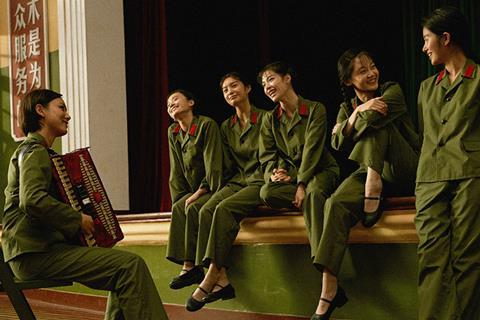Feng Xiaogang’s latest follows a military arts troupe in 1970s China

Dir: Feng Xiaogang. China. 2017. 148 m
Director Feng Xiaogang’s nickname as “the Chinese Spielberg” has rarely seemed as apt as it does in the case of Youth (Fang Hua). This sweeping saga of a generation marked by political and social upheaval is told with a combination of virtuoso filmmaking and unrelenting schmaltz.
Galloping across the decades, the film becomes increasingly sketchy and superficial
Undeniably engaging and pleasing to the eye, it has a populist emotional appeal that should attract vast domestic audiences following its premiere as a Special Presentation in Toronto, but probably not the same level of critical admiration that greeted Xiaogang’s previous feature I Am Madame Bovary.
Set in a military art troupe in 1970s China, Youth is a giddily ambitious mixture of backstage musical, bittersweet love story, coming of age drama, political commentary and blood-drenched war movie. Narrated by dancer Xiao Suizi (Chuxi Zhong), it begins on the day that He Xiaoping (Miao Miao) joins the troupe from Beijing. The newcomer’s father has been sent for re-education, and she is determined to excel and erase the shame attached to her family name. Wide-eyed and eager to please, she is astonished that she will be able to shower every day and at no cost. The other girls mock her naivety and bully her. Only the eternally kind and considerate Liu Feng (Xuan Huang) is sensitive to her situation.
There is a terrific energy and pace to Youth, as the young performers rehearse and dedicate themselves to perfecting the patriotic routines that will boost morale and extol the virtues of the People’s Republic Of China. The restless camerawork of Pan Luo darts into every corner of the compound, hustling the viewer into the heart of a story peppered with rivalries, broken hearts and private anguish.
Chairman Mao’s death in 1976 is the catalyst for the most interesting passage of the film, as we gain a sense of old certainties crumbling away. Once obedient students start to answer back, respect for authority diminishes, forbidden items become available and materialism gains a foothold. There is a suggestion that, for all the hardships and restrictions they endured, the close-knit troupe may have experienced the best years of their lives during the nightmare of the Cultural Revolution.
Youth journeys forward through a depiction of the Sino-Vietnamese war in 1979 filled with bloodshed and carnage, offering further updates on the fates of key characters well into the 21st century. In many respects, the kindest souls suffer the harshest fates. Liu Feng is a saintly figure whose life is marked by selfless sacrifice, devoted service and his constant focus on the needs of others. He Xiaoping suffers endlessly from the cruelty of others.
Strong performances throughout maintain our emotional involvement with Xuan Huang, making Liu Feng’s ceaseless virtue both admirable and affecting, whilst Miao Miao’s innocent He Xiaoping has the steely determination of a woman able to survive all the injustices heaped on her.
Galloping across the decades, the film becomes increasingly sketchy and superficial. There is so much detail and substance in the 1970s stretch of this epic that the twists of fate and rueful reflections of later years inevitably feel less authentic and closer to soap opera.
Youth does have its moving moments but it also plucks at those heartstrings with shameless vigour and the syrupy, soaring musical score is the biggest culprit in the process.
Production companies: Huayi Brothers
International sales: IM Global info@imglobalfilm.com
Producers: Zhonglei Wang, Zhongjun Wang, Yu Gong, Ge Song, Jianhong Qi, Fangjun Zhang
Screenplay: Geling Yan
Cinematography: Pan Luo
Editor: Qi Zhang
Prod design: Haiying Shi
Music: Lin Zhao, Xiaofei Dai
Main cast: Xuan Huang, Miao Miao, Chuxi Zhong






![The Brightest SunScreen[Courtesy HKIFF]](https://d1nslcd7m2225b.cloudfront.net/Pictures/274x183/3/5/0/1448350_thebrightestsunscreencourtesyhkiff_312678.jpg)














![The Brightest SunScreen[Courtesy HKIFF]](https://d1nslcd7m2225b.cloudfront.net/Pictures/100x67/3/5/0/1448350_thebrightestsunscreencourtesyhkiff_312678.jpg)


